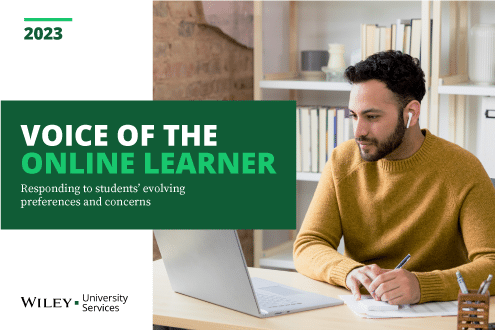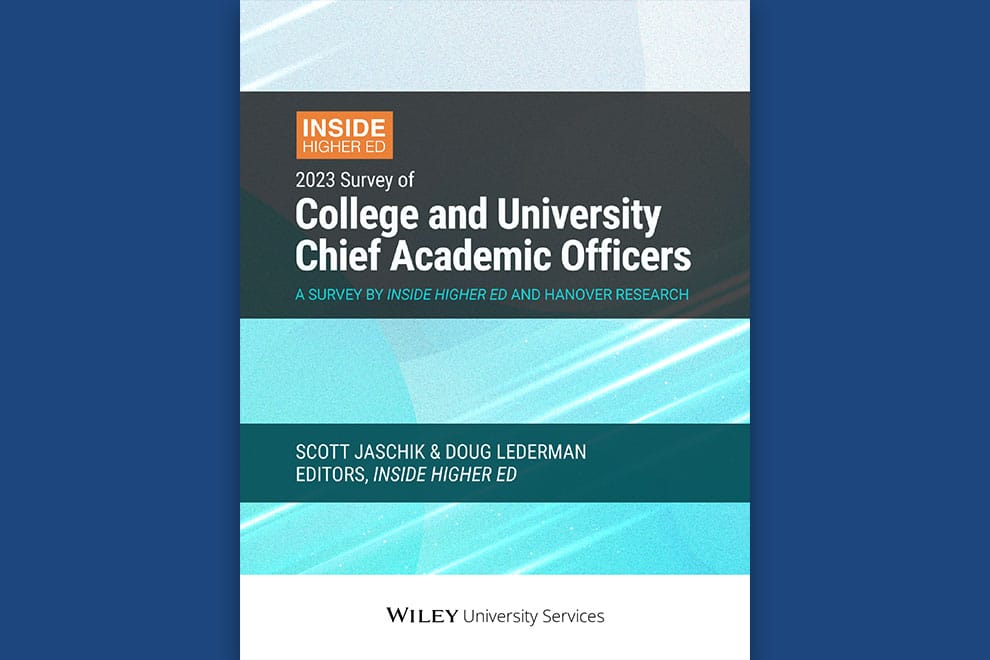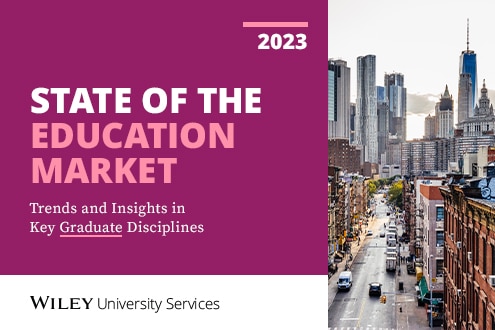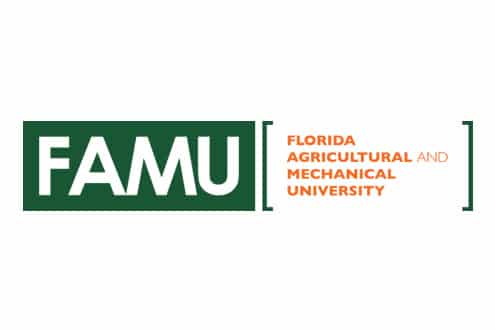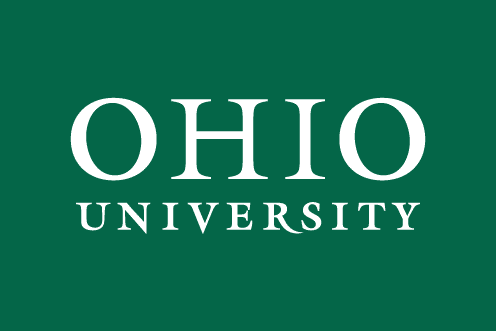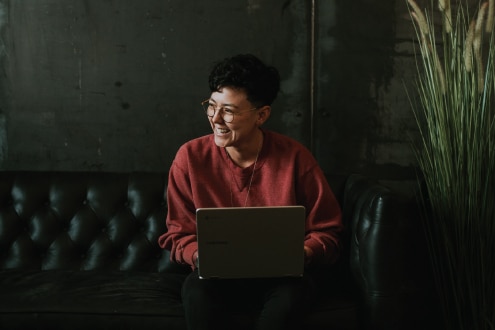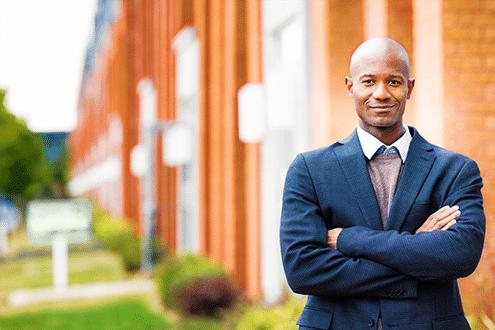Speaker 1:
You’re listening to An Educated Guest, a podcast that brings together great minds and higher ed to delve deeper into the innovations and trends guiding the future of education and careers. Hosted by the president of Wiley University Services, Todd Zipper.
Todd Zipper:
Hello, this is Todd Zipper, the host of An Educated Guest. On today’s show I speak with Lisa Flesher, chief of Realm 4, project acceleration at Arizona State University. Lisa helps guide unique technology enhanced projects to advance initiatives. This includes Dreamscape Learn, which empowers learners through fully immersive and interactive virtual reality learning experiences.
Todd Zipper:
The key takeaways from our discussion today: first, the five teaching and learning realms at Arizona State University, and how they can support innovation in higher education. Second, how we can use virtual spaces to turn students into explorers. Third, the Dreamscape Learning pod and how Hollywood and higher ed came together to create a fully immersive entertainment experience. Fourth, how virtual reality can serve as a compliment to face to face learning in both higher ed and K-12. And lastly, ASU’s corporate partnerships and how retention has increased at these businesses as a result.
Todd Zipper:
I hope you enjoy this conversation today. I spoke to Lisa while she was on campus at ASU with lots of students in the background. So great to see and hear these students back on campus.
Todd Zipper:
Hello, Lisa, and welcome to An Educated Guest.
Lisa Flesher:
Hi. Thanks for having me.
Todd Zipper:
Excellent. So for those of us in higher ed, when we think of innovation, when we think of scaled national universities, we often think of Arizona State University. The school has been ranked number one in innovation for six years in a row by US News and World Report. Michael Crow, president of ASU, and his team, have designed five teaching and learning realms in which ASU operates. With us today is Lisa Flesher, head of Realm 4, which is the education through exploration realm. If this sounds like something from sci-fi, you’re on the right track.
Todd Zipper:
All right, so let’s get started. First, Lisa, can you tell us about your journey and how you got into the higher ed administration world?
Lisa Flesher:
Yeah, happy to. And I will say you are not the first to make that exact comment about my title. So my undergrad was in education. I had a very brief stint in teaching middle school math. You know the outcome of that story as I am no longer a middle school math teacher. But I still had such a passion for education, and so I landed my first job at ASU, and 15 years later I’m still here. So I’ve worked in many departments and various initiatives, and I’ve just loved getting to see the incredible transformation of Arizona State over the years.
Todd Zipper:
Absolutely. So before we jump into the actual Realm 4, can you give us an overview of these five teaching and learning realms, and how the university got to this construct?
Lisa Flesher:
Yeah, happy to. So Realm 1 is our traditional campus based students, so students that are coming day to day, face to face, living in the dorms, et cetera.
Lisa Flesher:
Our second realm, as we were trying to evolve and create more opportunities for learners, was our digital immersion, so what you would know is ASU Online and students that are remotely all across the US and the world doing digital education. And we have still about 243 online degrees, so a very vast portfolio there as well.
Lisa Flesher:
After that, we started thinking about how we could do things a bit more large scale, and that’s when we … Realm 3 is massively open, so one of the projects there was our Global Freshman Academy, so taking a subset of our suite of freshman year courses and putting that on a MOOC platform so that it would be more accessible to multiple audiences.
Lisa Flesher:
Realm 4 is education through exploration, so immersion and exploring, and we’ll talk a lot more about that today.
Lisa Flesher:
And then Realm 5 is our infinitely scalable, so how do we reach millions? And so an example of that is our new partnership with YouTube and Crash Course, a project that’s called Study Hall.
Lisa Flesher:
So those are kind of an overview of the five realms, but ultimately it’s just continuing to grow and create more opportunities for more audiences in any education capacity they desire.
Todd Zipper:
Excellent. Can we dive into Realm 4, and can you tell us the types of projects you’re working on, and how you see this coming to life?
Lisa Flesher:
Yeah. So we honestly have a lot of units and a lot of projects that are already doing things in the space of Realm 4, that exploration space. But I would say right now Dreamscape Learn is our primary university wide initiative. It’s the first sort of large scale dive into how we embed fully immersive experiences into our courses, into our degrees, and specifically starting with biology.
Todd Zipper:
Great. So we can’t give everybody the visual experience here, but can you explain this idea of this immersion experience? And I know we’ve got movies like The Matrix, and it was over 20 years ago, or Ready Player One, which was about 10 years ago, the book that came out and then the movie. So we’ve been hearing about virtual reality. We now have Facebook changing its name to Meta, which is, I guess a nod to this idea of a metaverse. I’d love for you to kind of explain how you’re using virtual reality to sort of bring education through exploration.
Lisa Flesher:
Sure. We did announce before Meta, so can we be called the trendsetter? I’m not sure. But all jokes aside, I feel like ASU has started playing in this space a lot with little pilots. So for example, we have a unit called Education Through Exploration that has done some of this work. We have used something called Labster in many of our labs. That’s sort of a virtual space, and we launched that in 2018. So this feels like the next evolution, sort of a big step to how we use virtual spaces and can do virtual reality with our students.
Lisa Flesher:
And so this is just very different. I wish that everybody, to your point, could have the ability to see this, but it’s giving students the chance to go into a fully immersive, full body tracking experience, to become scientists in these environments, to explore and to learn and to create brand new ways of engaging the brain and solidifying the content. It’s what you think of VR, but it somehow feels even greater. It’s kind of combining all of the really good things in VR – incredible imagery, incredible storytelling, full body tracking. You kind of see one of these things in many of the virtual reality experiences you’ll try, but this combines a lot of the best of the best and just makes for an experience that’s honestly hard to explain until you see it.
Todd Zipper:
Yeah. I have the image of … Since I’m on my third child reading the Magic School Bus, and that experience where they go and the school bus gets tiny, and the biology you mentioned, and I remember that one where they go into the body. I mean, do you see that? I saw some videos with Michael Crow where the learner is now the explorer, that concept, which is really interesting.
Lisa Flesher:
That’s honestly exactly what we see. These students are, at least for our first pilot and what we’re doing with biology, they’re going into these little science laboratory pods where they drive around and they’re checking out creatures and they’re analyzing their habitats and seeing what could be disrupting what’s going on for them. So it’s exactly like you just explained, yes.
Todd Zipper:
So have you been imagining … You talked about biology. I think about jobs like becoming a doctor or a nurse, or we interviewed someone who’s the president of an online culinary school and they’re trying to figure out how to teach people to become chefs online. And they’re doing an amazing job, but they don’t yet have virtual reality. How far can we take this model? Can we create surgeons? Have you thought about some of these things or are you kind of really mostly in phase one?
Lisa Flesher:
Mostly in phase one, I’ll say that. I think when we watched others, like Department of Defense or medical industries, they’re ahead of us in what they’ve done in VR. I mean, you hear about virtual surgeries and all sorts of things going on. And so I think that really was a spark for us of, why couldn’t we use this education? If it’s being used in these really complex fields, it would have to have a really impactful place in higher ed. So I think that is one of many reasons why this really makes sense. And I also think even at ASU, we have relationships with Department of Defense and military, with Mayo Clinic and other, so it’ll be fun to see over time too, how we might even bridge the partnerships within and see how we can further expand what we can do in virtual reality.
Todd Zipper:
And can you maybe say a few more things about Dreamscape, because I know there’s some pretty famous people from Hollywood associated with it. It would make sense, right? Because you’re creating these Hollywood-like environments. It’s not maybe an initial skillset of, and technology for that matter too. So how is that partnership working right now?
Lisa Flesher:
So the head of Dreamscape Immersive, Walter Parks, he’s a famous movie producer. He was with Dreamworks. And so he spun off and created Dreamscape Immersive. And it was this power of narrative, Hollywood storytelling, and also a more immersive experience that’s hands on and that you can touch and feel and get completely lost in.
Lisa Flesher:
And so there was sort of a mutual acquaintance that had introduced Walter and President Crow. And when President Crow went and checked out the assets that Dreamscape Immersive had created, they were just wowed by each other’s energy and what each party was doing and how could we take the best of entertainment and the best of education and sort of play in this edutainment space?
Lisa Flesher:
And so even one of the assets that Dreamscape Immersive already had, called the alien zoo, right away President Crow was like, we could teach biology with this. We can embed curricular concepts on top of amazing experience. And so that’s sort of where the life took off of this partnership. And now here we are building curriculum for our biology degrees.
Todd Zipper:
How do the faculty think about it? Are they concerned? Are they excited? Obviously this is a new form of technology on top of over the last decade another new form of technology, just in teaching through online and the internet.
Lisa Flesher:
There will naturally be some faculty that are wildly excited and others that are still trying to understand how this would play out and trying to build some of that excitement. It reminds me of when online degrees started years back, there were faculty that really wanted to dive into it and others that remained skeptical for some time. And there’s a place in space for both.
Lisa Flesher:
But I would say the faculty members that we’re engaging with to create these first assets are just wildly excited. They see the potential, they see the power, they can’t wait to build their curriculum around it.
Lisa Flesher:
And our intention is not to replace them. I think that’s where you see some fears when faculty think, oh, the students are just going to go into this virtual space and I become obsolete, and that’s not our intention at all. It’s to augment and to compliment what is already occurring in the classroom and what is already occurring in the labs.
Lisa Flesher:
And so when they feel like they have that autonomy to build this curriculum around the experiences that happen for these short segments in the virtual space, I think it just opens up all sorts of possibilities, and we’re seeing a lot of energy and excitement around it.
Todd Zipper:
That’s fabulous. And I think at the core of this, in terms of ASU, the expansion of access to education, the affordability which you guys have been solving for, and driving outcomes, jumping into the outcomes here, I believe you’ve already been deep into pilots. I read that you had over 90 students engaged in this process, and I think you saw an increase in their performance and their outcomes in the classes. Can you touch on that? Because obviously, it’s nice to have a shiny new thing, but at the end of the day if it doesn’t drive learner outcomes, then maybe it kind of defeats the purpose. So I’d love to hear about that.
Lisa Flesher:
So the results that we did were very exciting, albeit a very limited test, so I’ll give that caveat. This spring when we fully launch, well, it’s still a beta launch, but when we launch Dreamscape we’re actually going to do a very formal research endeavor with control groups. And we’re really excited to see those results. We’ll analyze that data. We are hopeful that it will remain similar to what we saw when we did our pilot testing in April.
Lisa Flesher:
But the numbers you just shared, we’re talking about the difference of a student that might not have passed the class now passing the class, or a student that was going to do okay now being a master of their content, a master of their field.
Lisa Flesher:
Yeah, very excited. I think any learning gains will be incredible. When you’re talking about retention and about students succeeding every step, every percentage means something. But the initial numbers we saw are even more promising than that. And so if that continues to hold with time, people will be very interested in what virtual reality affords to learners because everyone will want that learning gain opportunity.
Todd Zipper:
So I know 20 years ago or so when online started to become big in education, people had issues with access to broadband and access to the right type of computers. How are you thinking about that in terms of the VR devices? I know we’ve got the Oculus with Facebook that’s pretty widespread right now, but these devices are expensive. How have you thought about just the device itself?
Lisa Flesher:
Great question. So for our first pilot it will specifically be for on campus students. And so they’re coming to the pods, they’re using all of the technology and equipment that we are setting them up for. They come in, they’re putting on the headsets, they’re putting on hand trackers, they’re putting everything that we provide for them. So of course that makes it easier and was a starting at the highest point.
Lisa Flesher:
But from day one, and based on ASU’s mission and charter, scale is no doubt where we’re driving towards. So we are aggressively figuring out how we have that 2D version for students at home, for our online learners to still experience these opportunities. And then ultimately the goal will be to get them on home headset devices like an Oculus.
Lisa Flesher:
There are things to consider. I think Oculus right now are about $299. That’s not insignificant, but it’s also not far from what students pay for textbooks. And our goal is to have these virtual experiences, either the longer narrative storytelling 18 sequence labs, or even small drop in experiences, embedded throughout the entire degree. So it’s a lot easier to justify a technology purchase that you’re not just using one time in one class, but through the continuum of your entire, let’s say undergraduate biology degree, makes it a lot more, I think, enticing and more feasible. But it’s something we’re still really considering because for some people $300 is not insignificant. So we will continue to work through those hurdles, but very, very top of mind for us.
Todd Zipper:
I noticed that ASU has a charter high school, at least one, on campus. Have you thought about how you can apply this learning methodology in K-12 schools?
Lisa Flesher:
Absolutely. Since day one. So some of the leaders of ASU Prep have been in all of our initial conversations. And we’re really trying to build the virtual reality assets to be applicable in both higher education and in K-12.
Lisa Flesher:
To be honest, the actual component of when you’re going into the virtual laboratory is a 10 minute segment, and then you go back out and you’re analyzing the data, or you’re discussing the samples that you collected while in the alien zoo, but all the curriculum still is built around it by that educator. And so whether they’re a freshman educator at ASU or they’re a senior educator in a K-12 space, that part is what is adapted, not the actual virtual reality experience. We’re trying to make that span across multiple ages, K-12 and higher ed. So just the surrounding curriculum is what would be adapted.
Lisa Flesher:
So we are very excited to pilot it with our prep high schools. And to be honest, a lot of the students … So Bio 100 is one of the first classes that we’re launching it in. Bio 100 is a class that often seniors in prep are already taking, so natural synergies.
Todd Zipper:
Absolutely. So have you thought about what other courses you might be going to next with this technology?
Lisa Flesher:
Yeah. Great question. So the first three, we have general biology one and general biology two for majors, and we also have general biology one for non-majors, so just to fulfill the science requirements for an undergraduate degree. So we’ll be launching it in those three classes, beta launch in spring of 2022, and a formal launch in fall of 2022.
Lisa Flesher:
But then we’re already exploring all sorts of other content areas. I won’t quite disclose those yet because we’re in early stages. But by all means, in the biology space, in the STEM space, and then in other curricular areas, we are drumming up all of the ideas.
Todd Zipper:
It sounds like the way you are positioning it, it’s very much complimentary to the entire educational process. It’s not mutually exclusive where, this is it. Now you’re going to go into this VR experience for 10 hours a week and that’s your course. Is that a good way to think about it?
Lisa Flesher:
Yeah, that is absolutely correct. So for example, in general biology one, which is Bio 181, the students will go through a series of nine times. So in a 15 week course, week one they’re getting acquainted with a course, and then it’s almost once a week through the course, because you have spring break and other holidays off. So it’s about one lab a week. And it’s just 10 minutes. And typically in a four credit class, you’re in class for four hours. So this is 10 minutes out of your four hour set of expectations. So it’s very much a small part of it. It’s a compliment to it, and it is not at all replacing. It’s not now your entire biology degree will be virtual. Not the case at all.
Lisa Flesher:
It’s something to further engage people that might not have otherwise resonated with the content. It engages different parts of the brains that creates longer lasting memories. And so our hope is just to bring additional learners along.
Lisa Flesher:
A lot of biology faculty and others over time have started off class and said, look left, look right. The people next to you won’t pass this class. And that’s crazy. Nothing about what we are doing should be stopping people from succeeding and passing. And so as we think of all of these new innovative approaches, this is engaging and bringing more students along that otherwise might not be successful. And those that would be, it’s further exciting them. So absolutely a compliment and an augment, not a replacement.
Todd Zipper:
Are there other strategies or projects, initiatives, that you’re working on as part of Education for Exploration, Realm 4?
Lisa Flesher:
This is the primary one. We are starting to talk a little bit about something called the virtual classroom. So it’s similar to what we’re talking about. It’s a virtual full body tracking experience, but instead of a more narrative based storytelling base, it’s really a place based experience. And so going somewhere that you otherwise might not be afforded the opportunity to go. So that’s the next place that we’re going to play and start building some concepts around. So for example, Mars, or going into a cell, or going to an ancient Roman Coliseum. The faculty member will still be in there with you and be the leader of the content, but you’ll be able to explore places that bringing those to life will be so much more meaningful than just reading about it in a textbook or seeing a flat 2D image. So that’s one of the things that we’re currently starting to play with.
Lisa Flesher:
And also excited, if we can go to a place virtually, seeing what levers we can pull. So let’s go to present day New York and while we’re in there, let’s see what did New York look like 50 years ago? If we keep operating the same way that we’re operating, what will New York look like 50 years from now? And does that change how we do water usage, how we’re building in the city climate and sustainability implications? And so allowing students to play with time and with scale and to see the impacts of those choices.
Todd Zipper:
It just seems like there’s no limit to the creativity here. You mentioned New York. Whether it’s allowing students to go to the 9/11 Memorial, where they’re probably not going to get to do that on a regular basis. Or seeing the show Hamilton somehow in that experience, as a theater major or something along those lines, would be incredible. Really exciting.
Todd Zipper:
So I know ASU, you guys have been on the cutting edge of a lot of stuff. You’ve started businesses. Even though you’re obviously a public institution, you’ve actually started some businesses. So do you imagine yourselves, since you’re on the cutting edge of this, potentially working with other universities, maybe as a partner, as a provider of the pedagogy, of the technology, of the process? Any thoughts there?
Lisa Flesher:
Yeah, absolutely. I honestly think Dreamscape Learn in many ways will be just that. Obviously there’s the parties at Dreamscape Immersive and the parties at ASU, but we are collaboratively working to build Dreamscape Learn together, and that will likely become its own entity and have the ability to support other institutions to license these products. So I think that’s exactly what this will become.
Todd Zipper:
Fascinating. So I want to switch gears for a second, just given your history and experience at ASU, and specifically around the work you’ve done with employers. ASU really pioneered an incredible groundbreaking partnership with Starbucks. And I’d love for you to just talk about that and how that’s going, I assume several years now from the original announcement, and sort of how that plays a part of the university’s vision and goals going forward.
Lisa Flesher:
Starbucks is going great. We have over 20,000 partners that are participating in the Starbucks College Achievement Plan. We have over 6,500 partners that have graduated. So those numbers are just incredible. It’s so exciting to see those Starbucks partners have the ability to … A lot of them had already started their education and stopped for whatever life reason. And so seeing those partners be able to continue and fulfill and complete their degrees is just so exciting. The numbers have been great and we love our Starbucks students.
Lisa Flesher:
But we have other partnerships. So we have a partnership with Uber, and we’re working closely with a company that was spun out called InStride that’s helping us find other business opportunities. So yeah, doing a lot in that space, and Starbucks specifically is going incredibly well.
Todd Zipper:
I was listening to another podcast the other day called Business Movers and it was about Howard Schultz, and really the last episode was about his legacy. And it really honed in on this idea that education will help recruit more individuals, will help retain more individuals, and help get them more skilled for a career path for themselves. 20,000 is really incredible. That’s bigger than most universities in and of itself. How are you seeing the institution Starbucks sort of seeing improvement in their business? Are they seeing outcomes? What are you guys getting fed back from the company?
Lisa Flesher:
I would say the biggest place that they’re excited about is the retention. So the retention of the students that are pursuing the program are just staying with the company longer. And those that finish degrees are often moving … Some. I mean, there’s only limited leadership opportunities at Starbucks, but many of them are persisting into leadership opportunities at Starbucks corporate. So very fun for them to be able to have those retention gains. And I love the early intentions where ultimately you’re having a better society when you have a well educated person. Their commitments and their contributions are only greater. And so I loved that initial reasoning for why Starbucks started this partnership with us. And I think they’re definitely seeing the fruits of those labors.
Todd Zipper:
Excellent. So another question in your background here, because I was really intrigued by the Global Freshman Academy that you all launched several years ago with, I believe edX, the MOOC platform, maybe it’s changed. But can you kind of talk to us about what that was and what you learned? I don’t know if you’re still running it, but it seemed like it had tremendous promise to really bring, again, open access and bring down the cost of education.
Lisa Flesher:
Yeah. I still have such a secret obsession with Global Freshman Academy. No longer in my purview. That’s one that I still feel like hasn’t had the full realization of market potential there. I think there was such a fear for people thinking that there was something about it that was too good to be true.
Lisa Flesher:
So Global Freshman Academy, we put our first year courses up on edX at the time, then they have since gone to Open edX and have had other changes of hosting platforms. But it was an alternative way to earn college credit.
Lisa Flesher:
So for students that had previously stepped away from their endeavors and maybe walked away under unfortunate circumstances, couldn’t get back into a university. If they started university 12 years ago and had a 0.03 GPA, they can’t come back again. And so Global Freshman Academy, either for those learners or for learners that have always wanted to do college, but were scared to take that first step, this was a chance to try sort of a no risk environment for doing these classes. And there was a very small fee, $25, to verify that you are who you say you are and do some proctored examinations, but only if and when you pass the class, then you could pay for credit. And so it just to me is an incredibly untapped opportunity for a no risk way to try your freshman year.
Lisa Flesher:
And so we did have some learnings. And it’s funny that you mentioned Starbucks before this, because it was actually with our Starbucks partner, we had something called Pathway to Admission, P to A. And so we had a whole bunch of Starbucks students that also were not admissible to the university. And so we said, okay, great. If you want to eventually get into the Starbucks College Achievement Plan, take these set of four classes on our open edX platform, pass them, then pay for credit, and you’re automatically admitted into ASU. And we saw a large population of students that did that, and so that’s kind of when we rebranded Global Freshman Academy, and now it’s called Earned Admissions. And so the whole point is earn your admission into ASU. Take these four classes and then there’s no more application processes and all the things. You’re automatically admitted in and you may start your degree.
Lisa Flesher:
And so we’ve seen thousands of students come through this now. And my favorite part about it is we no longer send denial letters at ASU. If you don’t meet the admissions criteria we say, here’s how you can begin your journey at ASU. Take these classes, and then after that you’re able to continue on and pursue the degree. So, I love that project.
Todd Zipper:
That’s incredible. And you can see how wide of a net and open you make it feel. I hope you guys continue to keep marching down that journey. You’re also flipping the cost of education on its head. I was just reading about, and I also interviewed the president of the University of the People, which has a similar model where it’s free until you actually pass the course effectively and are ready to move on, then you pay to kind of get that next gate. So the university has really got the right kind of skin in the game and the alignment on outcomes, which is just absolutely wonderful.
Lisa Flesher:
It’s all about the charter and the access mission. And to be honest, the courses are about a fourth of the price that they would otherwise be. So I mean, talk about a win-win situation for trying out college and ensuring it’s right for you before committing to paying thousands of dollars and then saying, ooh, I wasn’t quite ready for this.
Todd Zipper:
Exactly. So let’s look out five years. What do you see for the movement of the Dreamscape pod?
Lisa Flesher:
Great question. I think a lot of it will just be what we have learned and how we adapt that. Creating further agency within our experiences, expanding to other curricular, other colleges, other programs, other majors. But honestly it’s so hard to say what five years will look like from now. I wouldn’t have even imagined five years ago that we would be doing virtual reality in our classes. So some of this is very unknown and very hard to say, but I think we’re just dedicated to the expansion of this technology and to the experiences that it affords students. And I think the biggest thing is figuring out how we do this at scale, so for our learners at home on the home headset devices, the Oculus. Those are sort of the big things I think we’ll be focused on in the next couple of years. But in five years, I don’t know. Maybe you and I will be having this conversation in a virtual space instead of over this modality.
Todd Zipper:
I’m still hoping for that moment in The Matrix where Neo learns martial arts in about 30 seconds, but I don’t know if we’ll ever get there. But I know that I went to New York City the other day and went to the Banksy exhibit, and they have a whole virtual reality session where you kind of go through this made up town and you learn kind of all about Banksy and all about his art. And I’m just so excited for learners because engaging content is not easy to create. And you can just imagine how … I’m not going to say it’s easy, because I can only imagine the technology. When you mention things like a device costs $300 now, that’s pretty effective, we’re getting close, right? And now we got Hollywood coming in here and building things. So it’s a really exciting time. I’m wishing you guys the best you in making this happen. I think it’s going to catch on if you guys are effective here.
Lisa Flesher:
Now it’s keeping up with the speed of the content creation that we have to do. Let’s see how fast we can do this.
Todd Zipper:
Yes. And if you could bring the cost of that down surely, and bring it beyond your labs into people’s homes, which seems very possible. Any other innovations in higher education that have your attention? You seem quite consumed and busy, but anything else popping up these days?
Lisa Flesher:
Yeah. I think one other innovation that I’ve just been watching a bit is a lot of universities are really working towards these smaller stackable credentials. So the ability for learners to either upscale or get a certification or maybe more slowly move into their degree. I still see huge value in a degree, but I think universities also have so much content that can be unlocked. And a scenario where somebody already has a degree and they just want to up-skill in a certain arena. So I think meeting people across this entire learning continuum that they’re on, and figuring out these little nuggets, or big chunks of education, that they might want at any point in time in their career.
Lisa Flesher:
And it’ll also be fun as we build out these virtual reality assets to not have them embedded an entire course, but how can we unlock this single experience and share it with somebody and allow somebody to maybe come in and just learn about cellular biology or whatever they’re needing at that point in time. So, I’m excited.
Lisa Flesher:
Lots of other universities are spending very deliberate time on this. We’ve started a whole enterprise called the Learning Enterprise focused on this. And so I’m excited to see what’s the blend of these small credentials mixed with the full degrees that universities have to offer.
Todd Zipper:
I mean, ASU has been serving the new majority learner for so long now, and they don’t have time for the four year, immersive, full-time experience, or even the two year in some cases. And so with technology, with employers taking more of a seat at the table, it just feels like the timing is right for that kind of in and out of educational experience, and not just you go from your 18 years old to 22. So yeah, I couldn’t agree with you more.
Todd Zipper:
So anything that you want our listeners to take away today? One thing that sort of comes to mind?
Lisa Flesher:
Yeah. I just think with our creative leadership that is Walter, with this Hollywood filmmaking, and the excellence in access and education that President Crow brings to the table, I think Dreamscape Learn really merges those two incredible powers together, and I think it’s just going to further enhance access and enjoyment and outcomes. I think in the 21st century when engagement and keeping people, capturing their attention for very long is just so difficult. I truly think that virtual reality and what we’re doing with Dreamscape Learn is going to be a game changer. And I think especially in the fields of STEM and how we can make that more accessible, but also beyond in other disciplines. So very, very excited for the impacts that this will have at ASU, but very excited that our intentions are not just ASU. How do we bring other institutions and other K-12 partners along with us? So I think that would be the main takeaway.
Todd Zipper:
Excellent. So last question. I ask this of all my guests. Part of what we love about education is that we all have learning champions. Who has been a learning champion for you, and how has that person helped you in your life?
Lisa Flesher:
Do I have to pick one?
Todd Zipper:
You could pick a few.
Lisa Flesher:
That’s so hard. Honestly, I’ve had some incredible bosses over the last few years at ASU, [inaudible 00:31:51] and Phil Regier. Both of those, I would say have been learning champions. Just the ability to innovate, to try, to fail, to teach the lessons that they’ve learned, and having long tenures at a ASU. So I think those are some.
Lisa Flesher:
Obviously, from far away and more recently very near, to President Crow. I think watching what he’s doing with ASU and the New American University, no doubt has just been somebody that you want to get behind. You want to be part of what he’s doing. You want to be part of the mission. Obviously I work at ASU, so it’s easy to say that I’m a fan, but truly when you back up and see the things that ASU is doing and how they’re serving students and what the charter is, it’s so fun to work here. It’s so easy to get behind the mission.
Lisa Flesher:
So I think those are a few to name that have been incredible to be close alongside to.
Todd Zipper:
Lisa, thank you so much for taking the time to speak with me today. I can’t wait to see what Realm 4 at ASU brings to bear with its virtual reality and education through exploration. I feel like I want to take this course now and take biology all over again. It’s only been 25 years or so, maybe 30. Anyhow, until next time, this has been An Educated Guest.
Speaker 1:
Thanks for joining us on today’s episode. If you like what you’re hearing, be sure to subscribe to An Educated Guest on your listening platform so you don’t miss the latest episodes. For more information on Wiley University Services, please visit universityservices.wiley.com.






